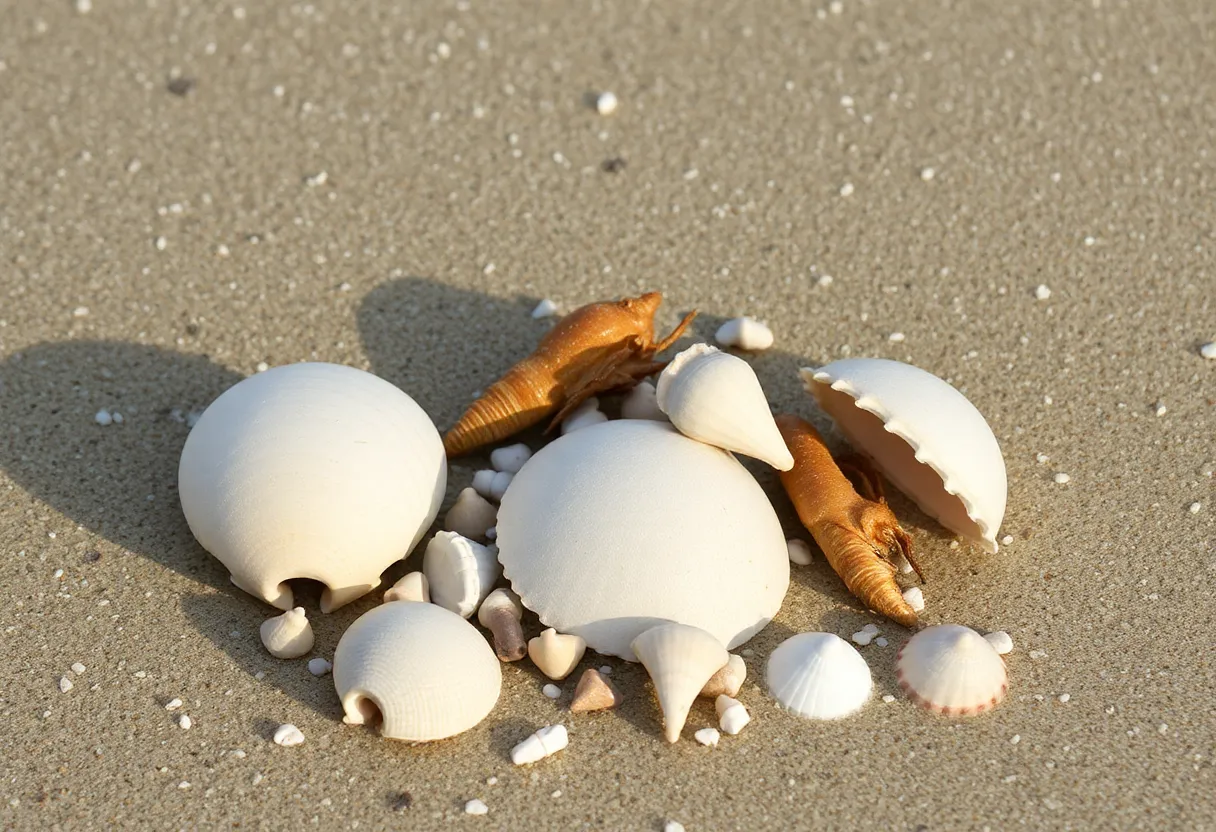

Seashells and washed-up sea creatures on sandy beach.
South Carolina beaches are not just summer destinations. Even as temperatures cool down, marine life continues to wash ashore, surprising many beachgoers. This seasonal occurrence is notable in cities like Charleston, where the South Carolina Department of Natural Resources (SCDNR) reported an increase in marine animals stranded on the shore.
According to Erin Weeks, a spokesperson for SCDNR, both visitors and locals should keep an eye out for stranded sea creatures. These range from smaller species like jellyfish and seahorses to larger animals such as sea turtles and dolphins.
During winter, marine life can often be found washed ashore, as strong winds and stormy conditions push them out of their natural habitat. “Winter is generally a quieter season here in South Carolina — in most places — but I think a lot of people would be surprised at how active wildlife remains,” said Weeks. The colder temperatures can also make certain species, like sea turtles, more susceptible to becoming stranded due to a phenomenon called cold-stunning.
Stranded marine creatures can be spotted along South Carolina’s coastlines, especially in areas frequented by the public. Popular beaches and quieter shorelines alike can be sites where these animals are pushed ashore by natural forces.
While it is common to see smaller creatures like jellyfish and seahorses washed up due to their limited swimming ability, caution is needed. Weeks advises staying away from venomous species such as **lion’s mane jellyfish** and **Portuguese men-of-war**, which can sting even after they are dead. In contrast, Cannonball jellyfish are more frequent in warmer months and are generally harmless.
For those willing to help, if you find a non-lethal creature, you can attempt to return it to the ocean. Weeks notes, “If you see a sea star or a seahorse washed ashore and you want to throw it back into the water, chances are that it’s been ashore for a while already, and it may not be alive anymore, but there’s no harm in throwing it back.”
It is crucial to help out where possible, particularly for larger species like sea turtles and marine mammals. If you encounter a sea turtle or a stranded dolphin, the best intervention is to maintain distance and contact the SCDNR’s hotline at 1-800-955-5431. This hotline operates specifically for instances involving marine mammals and protected species to ensure proper response and care.
Winter beachgoers should remain vigilant, as South Carolina’s coastal waters continue to pose risks to local wildlife. Understanding how to safely identify and assist stranded aquatic animals is essential for the well-being of these creatures. By knowing when to help and when to call for professional assistance, everyone can contribute to the protection of these vulnerable species.
In summary, South Carolina’s beaches offer more than just scenic views in the cooler months; they also serve as a reminder of the delicate balance between marine life and their environment, warranting care and attention throughout the year.
How Can You Use Neuromarketing to Enhance Your Digital Advertising Strategies? As digital marketing continues…
News Summary Barry Dooley, a beloved family member and community figure from Richland County, passed…
News Summary Greenville recently celebrated Michelin North America, Inc.'s 50-year presence in South Carolina. Local…
News Summary In an unexpected twist, 43 monkeys escaped from the Alpha Genesis Primate Research…
News Summary South Carolina has officially been declared the top growth state in 2024 by…
News Summary After a thrilling win over Texas A&M, Columbia, SC, experienced chaos as a…